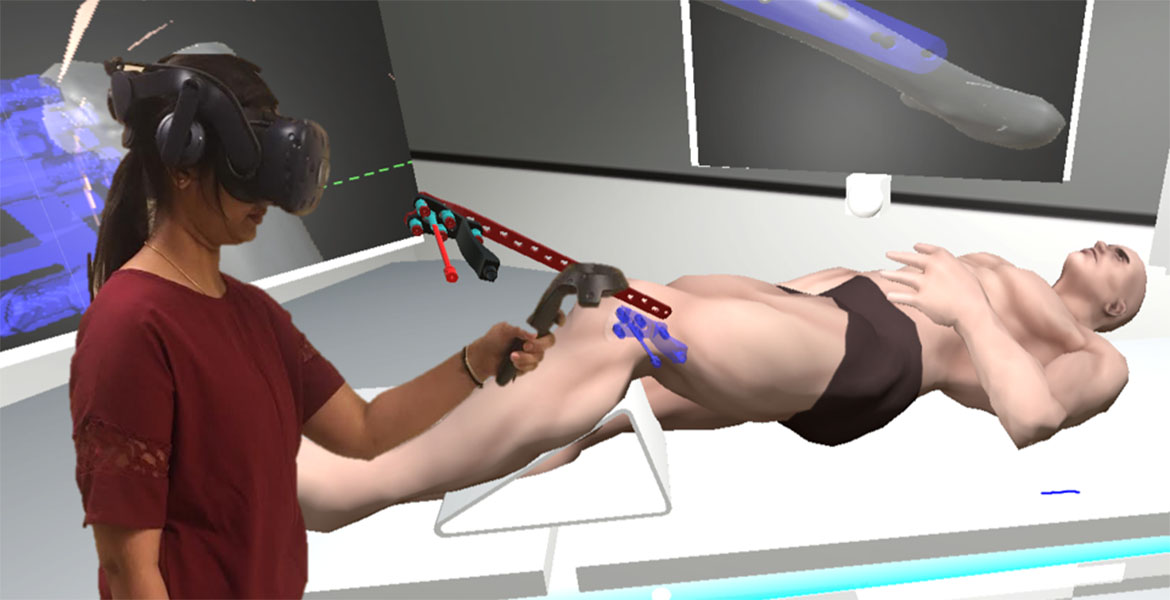
OSU wins NSF grant for COVID-19 training project
Tuesday, May 12, 2020
Researchers at Oklahoma State University have won a National Science Foundation grant related to COVID-19.
The grant will focus on creating a 3D virtual reality training program for first responders. The project is being led by Dr. J Cecil, co-director of the Center for Cyber-Physical Systems and director of the Virtual Reality and Information Centric Engineering Lab at OSU.
Researchers at the lab have pioneered the design of cyber-physical environments involving virtual reality/augmented reality technology and are using that knowledge to assist the nation’s COVID-19 response.
“We want the first responders to perform their tasks in a safe manner,” Cecil said. “With the risk of experienced first responders (nurses, physician assistants and others) themselves being infected, new first responders will have to be adequately prepared to step in and meet our health care demands.”
The primary goal is to create simulators to train first responders to test and treat patients safely and efficiently, Cecil said.
Rapid and safe training for first responders is vital in responding well to emergencies.
“The training modules we will create will help them be better prepared to follow health care guidelines when wearing N95 masks, face shields, protective clothing, etc.” Cecil said. “They will also provide a 3D virtual, immersive and intuitive medium to train first responders to interact with the patients, collect a respiratory specimen and become proficient in using a ventilator as part of treating a patient.”
The training will be offered through a variety of mediums, making it more accessible to hospitals and first responders.
“There will be three types of implementations,” Cecil said. “The non-immersive simulator can be run on any laptop. The immersive simulator will require using a VR system such as the Vive™ — hospitals can purchase the Vive™ for about $1,200 — and the third type will be capable of running on a tablet or smartphone.”
Utilizing VR gives hospitals access to affordable, adaptable and rapid training in the most realistic experience possible, he said.
“A VR simulation, in general, can be modified if necessary or the training scope extended at lower cost when compared to using physical models or dummies,” Cecil said. “Once you build a VR simulator, you can install it on many computers and VR systems.”
As needs change, the system can be modified across the platforms as well, Cecil said.
With a VR simulator, voice and text cues can be added. The simulation allows for a self-learning experience, which decreases the amount of people needed to train someone. A VR simulator can also identify a user’s mistakes repeat the process as many times as needed, Cecil said.
“Further, in a VR simulator, you can create a realistic surrounding environment such a triage area, hospital room or some other environment at a lower cost. Creating such 3D physical environments (in real life) is not feasible because of the higher cost and time,” he said.
Cecil’s team emphasizes a “participatory design,” which involves getting inputs from the customers and specialists during the design phase of the simulator, Cecil said. With this feedback, the team can incorporate the customer or expert’s perspectives early, he added.
“This is a RAPID (rapid response research) grant from NSF,” Cecil said. “Our plan is to work on this in an expeditious manner and have an initial version ready in three to four months.
“Currently, we are working with first responders at a hospital. Other interested hospitals and clinics are welcome to contact me,” Cecil said. “Once it’s completed, we plan to make it available through the web, along with providing free seminars on using it.”
Interested hospitals can contact Dr. Cecil at j.cecil@okstate.edu.
MEDIA CONTACT: Harrison Hill | Research Communication Specialist | 405-744-5827 | harrison.c.hill@okstate.edu
